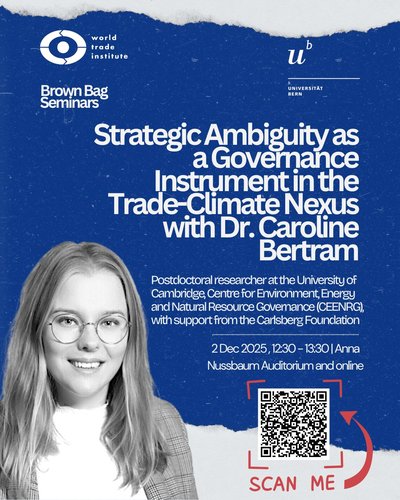Brown Bag Seminar
2 Dec 2025
,
12:30
-
13:30
| Download
Calendar Event (ICS)
Anna Nussbaum Auditorium and online,
Hallerstrasse 6, Bern, Switzerland
Strategic Ambiguity as a Governance Instrument in the Trade-Climate Nexus
The European Union (EU) has integrated commitments to effectively implement the Paris Agreement into its preferential trade agreements (PTAs), reflecting its dedication to aligning trade policy with the climate agenda. This commitment has evolved into a legally binding obligation in recent EU PTAs. However, it is simultaneously characterised by a high degree of imprecision, lacking interpretive guidance. This paper argues that the design of the Paris-PTA provision is intentionally crafted to ensure ‘strategic ambiguity’, which allows the European Commission to accomplish multiple objectives – economic, political, and institutional – at once. The paper suggests that the design of the EU’s Paris-PTA commitment has been informed by four main factors: societal/political demands, institutional fit, market access considerations, and reciprocal enforcement mechanisms. The research highlights the complexity of navigating the trade-climate nexus and questions the EU’s proclaimed role as an open, sustainable, and assertive trade power, asking whether this trifecta is attainable.
About the speaker
Caroline Bertram a postdoctoral researcher at the University of Cambridge, Centre for Environment, Energy and Natural Resource Governance (CEENRG), with support from the Carlsberg Foundation.
Her research investigates the EU’s trade-environmental policies, namely climate provisions in the EU’s preferential trade agreements and its unilateral instruments. Carolines also works on the intersection between international climate and economic governance, in particular interlinkages between the Paris Agreement and trade policy. More broadly, she interested in international cooperation, institutional design, regime interactions, climate change politics, and international political economy.
Caroline holds a PhD in Political Science from the University of Copenhagen and has previously been a visiting researcher at Ghent University. She has also been part of the University of Oxford’s Europaeum Scholars Programme for doctoral candidates.
In her PhD, she analysed trade and sustainable development (TSD) provisions in the EU’s preferential trade agreements, with a particular focus on climate aspects and the drive for more robust enforcement. The research integrated frameworks and insights from social constructivism, poststructuralism, foreign policy analysis, doctrinal research, and social network analysis to provide a more nuanced understanding of how TSD chapters fit into the EU’s broader trade-sustainability agenda, how they are designed, what purpose they serve, and what impact they have.
In her postdoctoral research, Caroline extended this focus to the EU’s unilateral trade-environmental instruments, specifically the carbon border adjustment mechanism (CBAM) and the regulation on deforestation-free products (EUDR), from the perspective of trade partners in the Global South. These measures have triggered significant political contestation, which she explores through a mixed-methods, cross-domain approach that moves beyond surface-level variables (e.g., economic impact and strategic discourse) to chart the nuances in Global South partners’ perceptions and contestations of these policies.


